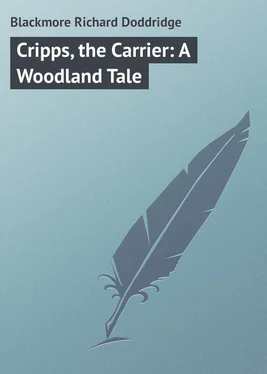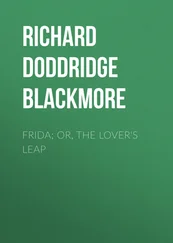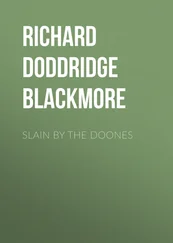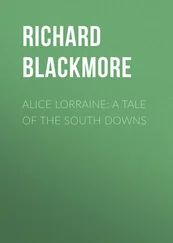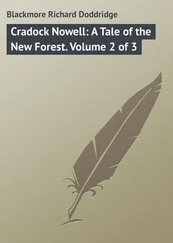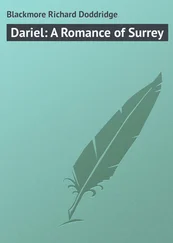Richard Blackmore - Cripps, the Carrier - A Woodland Tale
Здесь есть возможность читать онлайн «Richard Blackmore - Cripps, the Carrier - A Woodland Tale» — ознакомительный отрывок электронной книги совершенно бесплатно, а после прочтения отрывка купить полную версию. В некоторых случаях можно слушать аудио, скачать через торрент в формате fb2 и присутствует краткое содержание. ISBN: , Жанр: foreign_prose, на английском языке. Описание произведения, (предисловие) а так же отзывы посетителей доступны на портале библиотеки ЛибКат.
- Название:Cripps, the Carrier: A Woodland Tale
- Автор:
- Жанр:
- Год:неизвестен
- ISBN:http://www.gutenberg.org/ebooks/43281
- Рейтинг книги:4 / 5. Голосов: 1
-
Избранное:Добавить в избранное
- Отзывы:
-
Ваша оценка:
- 80
- 1
- 2
- 3
- 4
- 5
Cripps, the Carrier: A Woodland Tale: краткое содержание, описание и аннотация
Предлагаем к чтению аннотацию, описание, краткое содержание или предисловие (зависит от того, что написал сам автор книги «Cripps, the Carrier: A Woodland Tale»). Если вы не нашли необходимую информацию о книге — напишите в комментариях, мы постараемся отыскать её.
Cripps, the Carrier: A Woodland Tale — читать онлайн ознакомительный отрывок
Ниже представлен текст книги, разбитый по страницам. Система сохранения места последней прочитанной страницы, позволяет с удобством читать онлайн бесплатно книгу «Cripps, the Carrier: A Woodland Tale», без необходимости каждый раз заново искать на чём Вы остановились. Поставьте закладку, и сможете в любой момент перейти на страницу, на которой закончили чтение.
Интервал:
Закладка:
"Why, Thomas, we cannot expect to be always so young as we were once, you know."
"Nout to do wi' it – less nor nout. The raison lie all in the vittels, maister; the vittels is fallen from what they was."
"Thomas, you give me no peace with your victuals. You must groan to the cook, not to me, about them. Now, cut the cord. Why, what has Cripps been about?"
The bag was made of a stout grey canvas, not so thick as sacking, and as the creases of the neck began to open, under the slackening cord, three or four red stripes were shown, such as are sometimes to be found in the neck of a leather mail-bag, when the postmaster has been in a hurry, and dropped his wax too plenteously. But the stripes in these creases were not dry and brittle, as of run sealing-wax, but clammy and damp, as if some thick fluid had oozed from dripping fingers.
"I don't like the look of it," cried the old Squire. "Cripps should be more careful. He has left the bag down at his brother the butcher's. I am sure they never sent it out like this. Not that I am of a squeamish order, but still – good God! What is this that I see?"
With scarcely time for his cheeks to blanch, or his firm old hands to tremble, Squire Oglander took from the mouth of the sack a coil of long bright golden hair. The brown shade of the potatoes beneath it set off its glistening beauty. He knew it at a glance; there was no such hair in all Oxfordshire but his Gracie's. A piece of paper was roughly twisted in and out the shining wreath. This he spread in the hollow of his palm, and then put on his spectacles, and read by the waning light these words, "All you will ever see of her."
CHAPTER IV.
CRIPPS IN A QUANDARY
Worth Oglander, now in his seventieth year, although he might be a trifle fat, was a truly hale and active man. His limbs were as sound as his conscience; and he was well content with his life and age. He had seen a good deal of the world and of enemies, in the stirring times of war. But no wrong lay in the bottom of his heart, no harm ever done to any one, except that he had killed a few Frenchmen, perhaps, as all Englishmen used to be forced to do.
Moreover, he had what most folk now, of the very best kind, have almost outlived, a staunch and steadfast faith in the management of the world by its Maker. We are too clever now for all this, of course. But it must be allowed that this fine old faith bred courage, truth, and comfort.
"Whoever has played this trick with me," said the Squire, as soon as he recovered himself, "is, to say the least of it, a blackguard. Even for a Christmas joke, it is carrying things a great deal too far. I have played, and been played, many practical jokes, when there was nothing else to do; in winter-quarters, and such like. But this is beyond – Thomas, run and fetch Cripps. I will get to the bottom of this, I am resolved."
In a minute or two Master Cripps came in. His face was a little flushed, from the power of the compliments paid to Mary, but his eyes were quite firm, and his breeches and gaiters strictly under discipline of the legs inside them.
"Servant, sir," he said, touching his forelock, nearly of the colour of clover hay; "all correct, I hope, Squire, safe and sound and in good condition. That's how I deliver all goods, barring the will of the A'mighty."
"Tell me the meaning of this." As he spoke Mr. Oglander held up the bright wreath of hair, and pointed to the red stains on the sack. Cripps, as behoved a slow-minded man, stared at the hair, and the bag, and the Squire, the roof of the brewery, and all the tubs; and then began feeling in his hat for orders.
"Cripps, are you dumb; are you tipsy; or what? Or are you too much ashamed of yourself?"
"I ain't done nort for to be ashamed of – me, nor my father avoore me."
"Then will you tell me what this means? Are you going to keep me all night, for God's sake?"
"Squire, I never, I never see'd 'un. I know no more than a sto-un. I know no more than the dead, I do."
"Where did you get the bag? Was it like this? Who gave it to you? Have you let it out of sight? Did you see anybody come near it?"
"Squire, I can't tell 'ee such a many things. They heft up the barg to me at the Black Horse, where the bargs is alwas left for you. I took no heed of 'un, out of common. And no one have a titched him since, but me."
There was nothing more to be learned from Cripps, except that he passed the Black Horse that day a little earlier than usual, and had not brought his sister Esther, who was to have met him at the Golden Cross. He had come home by way of Elsfield, having something to deliver there, and had given a lift to old Shepherd Wakeling; but that could have naught to do with it.
It was now getting dark, and the Squire every moment grew more and more uneasy. "Keep all this nonsense to yourself now, Cripps," he said, as he stowed the bag under a tub, and carefully covered his daughter's hair, and the piece of paper, with a straining sieve; "it might annoy me very much if this joke went any further, you know. I can trust Thomas to hold his tongue, and I hope I can trust you, neighbour Cripps."
"Your honour knoweth what I be," answered the loyal Carrier. "Ever since I were a boy – but there, they all knows what I be."
Master Cripps, with his brain "a good piece doiled," as he afterwards said of it, made his way back to the cart, and mounted in his special manner. Although he was only two-score years of age, he had so much rheumatism in his right knee – whether it sprang from the mud, or the ruts, or (as he believed) from the turnpike gates – that he was bound to get up in this way. First he looked well up and down the lane, to be sure there was no other cart in sight, then he said "whoa-hoa" to Dobbin (who was always quite ready to receive that advice), and then he put his left foot on the little step, and made sure that it was quite steady. Throwing his weight on that foot, he laid hold of the crupper with his right hand, and placed his stiff knee on the flat of the shaft, never without a groan or two. At this stage he rested, to collect his powers; and then with decisive action flung his left foot upon the footboard, and casting the weight of his body thither, came down on the seat, with a thump and rattle. He was now all right, and Dobbin felt it, and acknowledged the fact with a grateful grunt. Then Carrier Cripps took up the reins, and made a little flourish with his brass-bound whip, and Dobbin put up his head, and started with his most convenient foot.
"I dunno what to make of this here start," said Cripps to himself, and his horse and cart, as soon as he had smitten his broad chest long enough to arouse circulation. "Seemeth to me a queer thing truly. But I never were a hand at a riddle. Wugg then, Dobbin! Wun'not go home to-night?"
CHAPTER V.
A RIDE THROUGH THE SNOW
Meanwhile the old Squire, with a troubled mind, kept talking and walking about, and listening for the rumble of his sister's carriage, the clank of horses' hoofs, and the ring of wheels upon the frozen road. He could not believe that any one in the world would hurt his darling Gracie. Everybody loved her so, and the whole parish was so fond of her, and she had such a way of easing every one's perplexities, that if any villain durst even think of touching a hair of her blessed head – yet whose hair was it? – whose hair was it? And such a quantity as never could have been cut with her consent!
"This is too much! I cannot bear it!" he said to himself, after many a turn, and anxious search of the distance; "Joan's carriage should have been here long ago. My darling would have made them keep their time. I cannot stop here: I must go to meet them. But I need not startle any one."
To provide for this, he just looked in at the kitchen door, and told the old cook to keep the dinner back awhile; for the roads were so bad that the ladies were almost sure to be behind their time; and then he went quietly to the stable, where the horses were bedded down, and by the light of an old horn lantern saddled and bridled his favourite hack.
Читать дальшеИнтервал:
Закладка:
Похожие книги на «Cripps, the Carrier: A Woodland Tale»
Представляем Вашему вниманию похожие книги на «Cripps, the Carrier: A Woodland Tale» списком для выбора. Мы отобрали схожую по названию и смыслу литературу в надежде предоставить читателям больше вариантов отыскать новые, интересные, ещё непрочитанные произведения.
Обсуждение, отзывы о книге «Cripps, the Carrier: A Woodland Tale» и просто собственные мнения читателей. Оставьте ваши комментарии, напишите, что Вы думаете о произведении, его смысле или главных героях. Укажите что конкретно понравилось, а что нет, и почему Вы так считаете.
